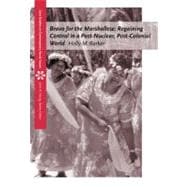
What is included with this book?
| Foreword | xi | ||||
| Preface | xiii | ||||
| Introduction | 1 | (3) | |||
| Chapter 1 Setting the Stage: Geography, Social/Political Organization, and the Language of the Marshall Islands | 4 | (11) | |||
|
4 | (5) | |||
|
9 | (1) | |||
|
9 | (2) | |||
|
11 | (4) | |||
| Chapter 2 A Colonial History of the Marshall Islands | 15 | (18) | |||
|
15 | (2) | |||
|
17 | (7) | |||
|
24 | (5) | |||
|
29 | (1) | |||
|
29 | (4) | |||
| Chapter 3 The U.S. Nuclear Weapons Testing Program | 33 | (17) | |||
|
33 | (2) | |||
|
35 | (3) | |||
|
38 | (11) | |||
|
49 | (1) | |||
| Chapter 4 Ethnography and a Marshallese Narrative of History | 50 | (10) | |||
|
51 | (2) | |||
|
53 | (1) | |||
|
53 | (2) | |||
|
55 | (1) | |||
|
56 | (1) | |||
|
57 | (2) | |||
|
59 | (1) | |||
| Chapter 5 Alienation from the Land: The Rongelap Experience | 60 | (19) | |||
|
60 | (1) | |||
|
61 | (3) | |||
|
64 | (1) | |||
|
64 | (1) | |||
|
64 | (3) | |||
|
67 | (1) | |||
|
68 | (2) | |||
|
70 | (2) | |||
|
72 | (2) | |||
|
74 | (4) | |||
|
78 | (1) | |||
| Chapter 6 Language and the Testing Program | 79 | (18) | |||
|
80 | (2) | |||
|
82 | (14) | |||
|
96 | (1) | |||
| Chapter 7 Uncovering Themes in Linguistic Data | 97 | (18) | |||
|
98 | (4) | |||
|
102 | (3) | |||
|
105 | (6) | |||
|
111 | (3) | |||
|
114 | (1) | |||
| Chapter 8 Changed Circumstances: A Petition to the U.S. Congress | 115 | (6) | |||
|
117 | (1) | |||
|
117 | (2) | |||
|
119 | (1) | |||
|
120 | (1) | |||
| Chapter 9 Other Case Studies | 121 | (19) | |||
|
121 | (3) | |||
|
124 | (3) | |||
|
127 | (3) | |||
|
130 | (2) | |||
|
132 | (4) | |||
|
136 | (2) | |||
|
138 | (2) | |||
| Chapter 10 Methodology and Community Empowerment | 140 | (13) | |||
|
140 | (1) | |||
|
141 | (1) | |||
|
141 | (1) | |||
|
141 | (1) | |||
|
141 | (1) | |||
|
142 | (1) | |||
|
143 | (1) | |||
|
143 | (2) | |||
|
145 | (1) | |||
|
146 | (1) | |||
|
147 | (1) | |||
|
148 | (1) | |||
|
148 | (1) | |||
|
148 | (1) | |||
|
149 | (2) | |||
|
151 | (2) | |||
| Chapter 11 A Broader Understanding of the Consequences of the Testing Program | 153 | (6) | |||
|
154 | (2) | |||
|
156 | (2) | |||
|
158 | (1) | |||
| Bibliography | 159 | (6) | |||
| Appendix Categories for Personal Injury Awards, Nuclear Claims Tribunal | 165 | (2) | |||
| Glossary | 167 | (1) | |||
| Credits | 168 | (1) | |||
| Index | 169 |
The New copy of this book will include any supplemental materials advertised. Please check the title of the book to determine if it should include any access cards, study guides, lab manuals, CDs, etc.
The Used, Rental and eBook copies of this book are not guaranteed to include any supplemental materials. Typically, only the book itself is included. This is true even if the title states it includes any access cards, study guides, lab manuals, CDs, etc.